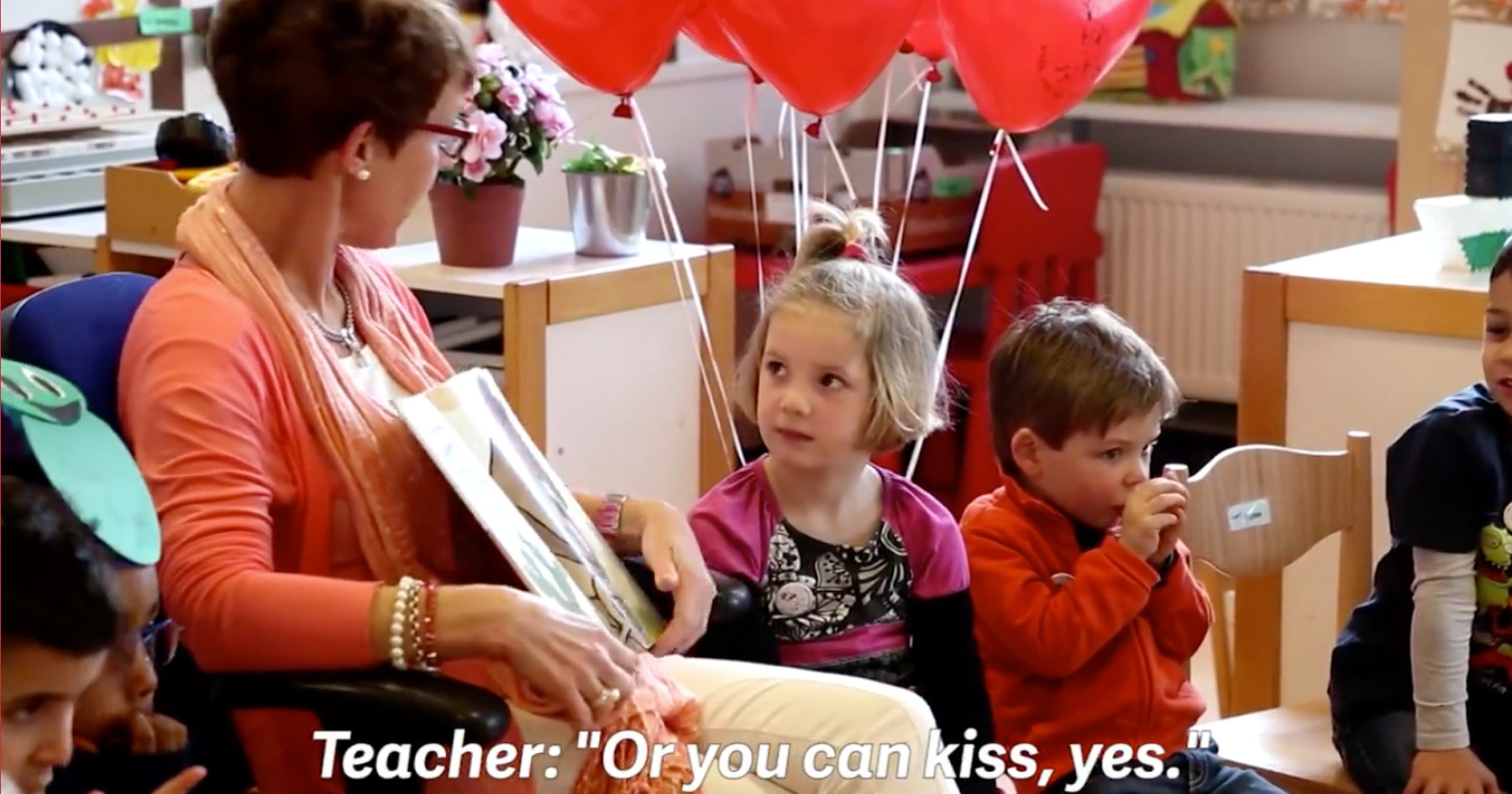Ways High Schools Teach Rape Culture

By:
In recent years, campaigns like Emma Sulkowicz' Columbia thesis "Carry That Weight" — in which Sulkowitz carried the dorm mattress on which she was allegedly raped around campus — and "Unacceptable Acceptance Letters" — videos and ads of fake college acceptance letters warning high school seniors about the realities of college sexual assault — have increased awareness about rape culture at colleges and universities. But rape culture doesn't begin in college, and its earlier iterations are discussed far less frequently.
For many students, rape culture also comes into play in high school and colors their formative experiences of sexuality.
Here are 5 ways high school experiences enforce rape culture.
1. Abstinence only sex education
Less than half of U.S. states require any form of sex education, and 27 states require abstinence-only sex ed courses, according to the Guttmacher Institute.
But abstinence only sex ed hasn't proved to actually dissuade teenagers from having sex — America has the highest rate of teen pregnancy in the developed world. Mississippi, a state with abstinence-only sex ed, has recently had consistently higher teen birth rates than the national average.
Also, by not teaching comprehensive sex education — only not to have it — schools miss an opportunity to teach about consensual sex. As ATTN: has previously reported, the 2015 #BetterSexTalk campaign asked participants to answer the question, "If you could give one piece of advice to a younger sibling about sex, what would you say?"
"Frankly, I didn’t learn the concept of 'affirmative consent' until I delved into my own activism; essentially, my sex ed. was self-taught," Josy Jablons, who created the campaign as an undergraduate at New York University told ATTN: in an email back in 2015.
In February, President Barack Obama proposed cutting funding for abstinence only programs in his Fiscal Year 2017 budget proposal.
 AP Photo/Pablo Martinez Monsivais - apimages.com
AP Photo/Pablo Martinez Monsivais - apimages.com
As ATTN: has previously reported, the Netherlands has a considerably less puritanical standard sex education curriculum than the U.S., and the country also has an extremely low teen pregnancy rate. A study on 12- to 25-year-olds in the Netherlands found that most respondents reported that their first sexual experiences were “wanted and fun.”
Denmark as well, where sex ed classes begin at age four and teach students age-appropriate lessons about love, relationships, gender identity, sexual identity, contraception and consent staggered throughout their academic years.
 Faebook/PBS Newshour - facebook.com
Faebook/PBS Newshour - facebook.com
Redditor AuroraSinistra, who posted images from a Danish children's book about sexuality on the site earlier this year, shared the open conversations she had with her parents about sex as a young adult, and she said that they stressed the importance of consent throughout these discussions. She wrote:
"I told my parents about my first kiss, the first time I let a boy touch my breasts, and the first time I rubbed my hand on the outside of a boy's shorts and felt him hard underneath. There were many many conversations with my parents, each with the central theme that I should never let myself be pressured into anything and that it was 100 percent okay to do sexual things if they were my choice and I wanted them to happen. They also always reminded me not to make choices in the heat of the moment and to consider internally if I wanted it for myself or to make the boy happy."
2. Slut-shaming dress code regulations
The way many high schools enforce dress codes can be very harmful to young women and typically blames boys' behavioral and academic issues on girls and their "distracting" clothing choices. In 2015, women spoke out against the sexism inspired by punishing women for violating outdated dress codes with the social media hashtag #IAmMoreThanaDistraction.
Blaming young women for "asking for" sexual attention with their clothing choices teaches them that they are to blame when boys objectify or sexualize them against their wishes, and it promotes the sexist misconception that men simply can't control their sexuality.
While it's crucial to teach adolescents that no means no, it's also valuable to communicate the lessons of affirmative consent — that only yes means yes, and that how a woman dresses or behaves never should be taken as a green light to have intercourse.
3. Unequal social pressure about sex for men and women
Many young adults have their first sexual experiences in high school, but losing your virginity in these years also affects men and women very differently. As ATTN: has previously reported, a 2015 study on 30 rural communities in Iowa and Pennsylvania found that the average student had sex for the first time around 17.
Having sex before 17 had opposite social impacts on men and women: girls who had intercourse earlier were 45 percent less accepted by their peers, while boys were 90 percent more accepted due to sexual activity.
While peer pressure alone doesn't make people rapists, a cultural climate that rewards men for having sex and punishes women may reinforce victims' hesitance to speak up about being sexually assaulted.
4. Prom night sexual pressure
The myth of prom night the sexual expectations may also cause young adults to have sex before they actually want to, Bustle pointed out.
The cultural myth of prom suggests that men are entitled to sex with their dates after the dance, which diminishes the importance of consent in individual sexual encounters. According to a Kaiser Family foundation study on adolescents between the ages of 15 to 17, one in three boys and 23 percent of girls felt pressured to have sex.
5. Administrative victim-blaming
Title IX asserts that schools are supposed to accommodate and protect students who come forward with sexual harassment and assault allegations. But high school administrators don't always do so in practice.
The Huffington Post reviewed numerous sexual assault cases across the U.S. and observed an unsettling trend:
"A common complaint in a number of cases nationwide that were reviewed by HuffPost — through interviews, confidential complaints, open records requests and in police and court documents — is that high schools fail to look into reports of student-on-student sexual assault cases at all. Some schools explain this by stating they won’t take any action against an accused perpetrator unless police tell them a crime was committed, though experts say this runs counter to federal law under Title IX."
Some schools ultimately punish the victims, Adele P. Kimmel, a senior attorney at the firm Public Justice, told the Huffington Post.
"As surprising as it may seem to expel an alleged victim of sexual violence because a school decided it was consensual, Kimmel says she’s seen that before. In one case she’s currently working on, a girl reported to administrators that she was sexually assaulted at school by a student right after classes. Kimmel said the school, which she’s declined to name publicly at this point, suspended the girl and the alleged perpetrator. That’s against the law, according to Kimmel, because reporting that someone sexually assaulted you is a protected civil rights activity."
On Jezebel, writer Zoha Qamar chronicled her experience of being chastised by prep school administrators after writing an op-ed about rape culture in a campus newspaper. Her piece criticized the school's ban on grinding at school dances, which Qamar believed was sweeping rape culture under the rug by "addressing symptoms rather than causes, dismissing victims, and stifling conversations."
Qamar also believed that the Dean of her prep school was hoping to avoid the kind of PR scandal that faced the nearby school Labrie had attended. The Dean also allegedly expressed sympathy for Labrie, according to Qamar:
"On that September afternoon, the Dean expressed his sympathy for Labrie, who, in his eyes, was a student-athlete with a promising future, successful by all conventional prep school standards (varsity athlete, campus and residential dorm leader, Ivy-bound). He seemed like a 'good kid,' the Dean said, just 'allegedly' accused of rape.
"The Dean’s main concern was, he admitted, personal; he confessed the profile of Labrie, to a considerable extent, matched those of his soccer or hockey boys at Exeter—boys with girlfriends whom they treated well, as far as he was concerned. This was enough for him, a powerful administrative leader, to effectively annul or at least dismiss Labrie’s charge of rape."
A disturbing case in the news.
Recently, attorneys of 21-year old sex offender Owen Labrie — who was was convicted in August for sexually assaulting a 15-year-old girl as part of a competitive senior ritual — presented a letter from an unnamed professor, in an argument to reinstate Labrie's bail after a curfew violation, Jezebel reported.
The letter illustrates the victim-blaming tendencies characteristic of rape culture, by painting the perpetrator as a victim and couching the violent nature of sexual assault with a "kids will be kids" attitude. The professor describes Labrie — who allegedly lured a 15-year-old classmate into a vacant room and assaulted her — as simply one of many " ordinary kids who get involved in teen-age sex play."
The anonymous professors letter appears to display a false equivocation between sexual experimentation and sexual assault — seeming to suggest that Labrie's violating consent was simply a feature of sexual inexperience. This isn't the case — having sex with someone who says or communicates that they don't want to have sex is rape, whether it's your first time having sex, or an encounter with long time partner who consented to the same act in the past.
1 in 5 high school girls experiences dating violence.
The fact that a chilling 20 percent of college women report being sexually assaulted on college campus has become a fairly widely known statistic.
There is considerably less awareness about sexual violence in high schools. Yet according to a 2015 CDC survey, one in five female high school students and one in ten male students had experienced dating violence — "the physical, sexual psychological or emotional violence within a dating relationship, including stalking."
When we address rape culture, it's important to recognize that is doesn't begin during freshman rush week. What young adults learn about sexuality in high school impacts the attitudes and expectations they bring to college, and it influences how they approach sex and relationships on campus.
